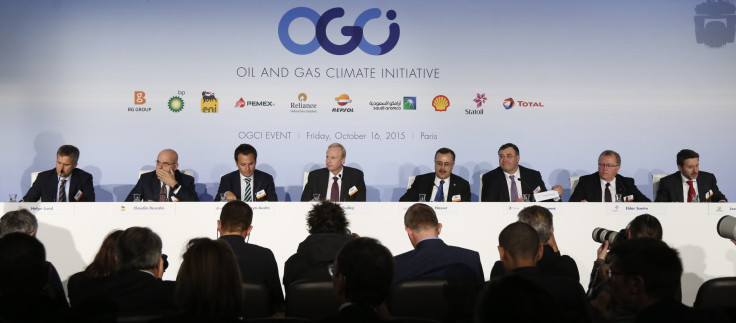BP’s Bob Dudley Urges Global Carbon Price To Meet Paris Climate Change Goals

The head of one of the world’s largest oil and gas companies urged governments Wednesday to adopt a global price on carbon dioxide emissions. BP chief executive Bob Dudley said policymakers must create the right incentives for investing in renewable energy and other lower-carbon energy supplies.
Dudley warned that BP sees climate emissions rising by 1 percent a year to 2035. At that level, countries would fail to meet international targets for limiting global warming, he said during the International Petroleum Week conference in London.
“We need a global carbon-pricing mechanism,” the oil executive said. He pointed to BP’s latest projections that global energy consumption will rise 37 percent from 2013 to 2015 due to rapid growth in Asia and the booming global population.
Carbon pricing “provides the right incentives for everyone to play their part,” he added.
The petroleum conference this week marks the first major gathering of oil and gas executives since the Paris climate change summit in December. Leaders from nearly 200 nations reached a sweeping deal to curb carbon emissions and shift the world away from oil, gas and coal and toward low-to-zero emissions sources like solar power and certain biofuels. Countries set a goal to limit global warming to “well below” 2 degrees Celsius (3.6 degrees Fahrenheit) above pre-industrial levels.
Dudley spoke during a half-day session that focused entirely on the future of oil and gas production in a carbon-constrained world. Conference organizers said this was the first time International Petroleum Week dedicated any event to global warming – a problem that’s directly linked to the burning of fossil fuels in power plants and vehicles, according to climate scientists.
“Climate was always an afterthought,” said Raphael Vermeir, who chaired the event’s program board and was formerly a vice president at ConocoPhillips, the U.S. oil and gas giant. But in light of the Paris summit, investors, executives and other groups pressured organizers to put climate issues high on the agenda, he said.
“We got so many comments that, ‘You need to talk about this. This is not something that you can just push under the carpet,” Vermeir said.
Oil and gas companies for decades fought to block carbon-cutting policies or dispute the science on climate change. In the last year, though, BP and other major producers have started backing efforts to address climate change, including carbon pricing. The policy would raise the cost of extracting and using oil. But it would benefit companies with large investments in natural gas, a fuel that produces fewer carbon emissions than coal and oil when burned. (Natural gas does, however, produce higher levels of methane – which is dozens of times more potent than CO2 when it comes to global warming.)

BP in the last year has moved aggressively into natural gas. The British oil giant in October signed a $10 billion contract to supply a Chinese power company with liquefied natural gas. Last March, BP reached a $12 billion deal to develop natural gas resources in Egypt. Other oil giants are making similar moves. Royal Dutch Shell Plc is in the process of acquiring BG Group, a $70 billion deal that would make Shell the world’s largest producer of liquefied natural gas.
At the London conference, Dudley said the “quickest way” to lower carbon emissions is to boost natural gas use in power plants and vehicles.
Yet for all their talk of confronting climate change, oil and gas companies haven’t signaled they plan to stop extracting fossil fuels or searching for new reserves.
To meet the 2-degree climate target, about one-third of oil reserves, half of natural gas reserves and 80 percent of coal reserves can’t be burned in order to limit global warming to 2 degrees Celsius, researchers from University of College London found in a 2015 study published in the journal Nature. Those limits mean most Canadian oil sands, all Arctic oil and gas and much of the world’s shale oil and gas could not be exploited in a low-carbon world.
But energy companies have no reason to leave those reserves in the ground so long as the world stays thirsty for oil and gas, said Fred Beach, assistant energy and technology policy director for the Energy Institute at the University of Texas in Austin.
Despite the volatility in today’s oil markets, the International Energy Agency still forecasts global oil demand will reach 103.5 million barrels a day in 2040, up 14 percent from 90.5 million barrels a day in 2014.
“It’s not the oil and gas companies that buy the products. They’re just producing a product that consumers seem to want,” Beach said. “From a global perspective, I don’t see any abatement in that demand.”

Oil and gas demand could slip over time if consumers have more viable, affordable alternatives to petroleum-powered vehicles and fossil fuel-fired electricity. Yet scaling up alternative supplies requires spending billions of dollars for research and development – an investment that’s harder to justify when plunging oil prices erode companies’ budgets.
Crude prices have dropped about 70 percent from their mid-2014 peak amid fears that global oil supplies are far surpassing the world’s demand for petroleum. Brent crude, the global oil-price gauge, was trading just above $30 a barrel early Wednesday.
Amid the price collapse, BP reported a post-tax loss of $6.4 billion for 2015, its worst loss in 20 years. The company’s full-year profits fell by more than half to $5.9 billion in 2015 down from $12.1 billion the previous year, the company reported Feb. 2. Chevron Corp., the No. 2 U.S. oil producer, said it swung to a loss in fourth-quarter 2015 for the first time in more than 13 years.
“When crude prices fall like they have, and your cash flows are getting constrained, [investing in clean energy] is a luxury that they can’t afford,” said Stewart Glickman, group head for energy equity research at S&P Global Market Intelligence. “The more pressing issue is, ‘What do I do to get through this calendar year, through 2017, and to best position myself for the next upturn?’”
Vermeir, the program chair for International Petroleum Week, said fears that oil prices would stay low for longer pervaded the conference.
“If that’s the case, it doesn’t bode well for decarbonizing the economy,” he said. “That’s going to be pushed back a little bit.”
© Copyright IBTimes 2024. All rights reserved.





















